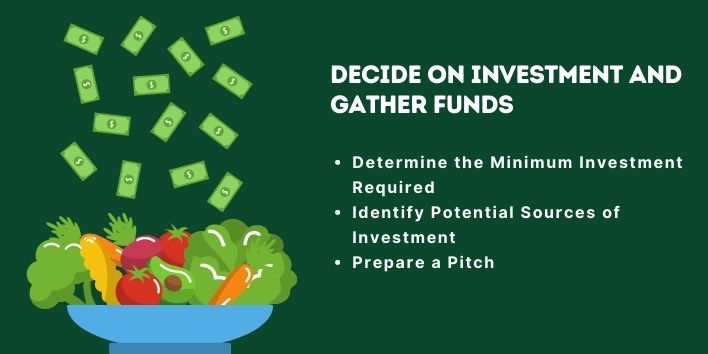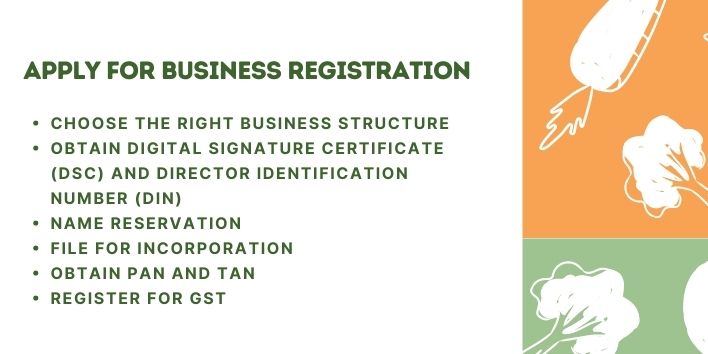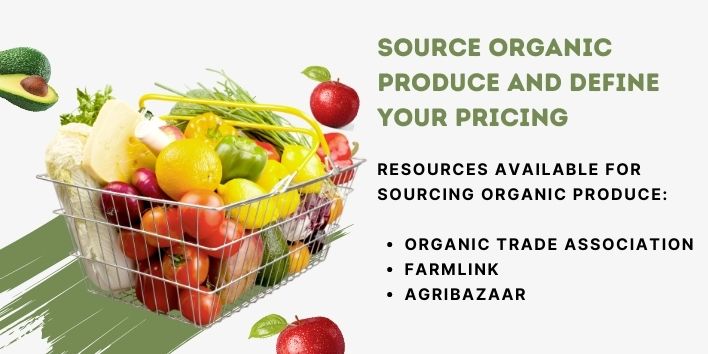How to Launch Your Own Organic Food Business

Are you passionate about organic food and looking to turn your passion into a business?
Well, you're in luck!
Starting your own organic food business can be a fulfilling experience as you can contribute to promoting healthy food choices and sustainable practices.
Not to mention, the increasing demand for organic food provides a lucrative opportunity for you to make a profit while making a positive impact on the world.
So, let's get started!
Step 1 - Conduct Market Research
The first step to launching your own organic food business is to conduct market research.
This step is crucial in understanding your potential customers and identifying your competition.

Ways to Conduct Market Research
Here are some ways to conduct market research:
- Identify your target market:
Determine who your potential customers are and their preferences.
This can include demographics such as age, gender, and location, as well as psychographics such as lifestyle and values.
- Analyze the competition:
Research other organic food businesses in your area and online. Look at their products, pricing, and marketing strategies.
It will help you identify opportunities and gaps in the market.
- Gather data:
Collect data through surveys, focus groups, and online research.
You can use online survey tools such as SurveyMonkey or Google Forms to conduct surveys.
Additionally, you can use websites such as Yelp or Google Reviews to gather customer feedback on your competition.
- Use market research software:
There are various software tools available such as Qualtrics or SurveyGizmo that can help you conduct market research and analyze data effectively.
Example: Let's say you're planning to start an organic juice business. You can conduct surveys and focus groups to gather information on customers' preferences for organic juice flavors, packaging, and pricing. You can also research online to analyze the competition and identify potential gaps in the market, such as a lack of organic juice options in your area.
Overall, conducting thorough market research will help you make informed decisions about your business and set you up for success in the organic food industry.
Step 2 - Develop a Business Plan
Once you have gathered information about the market, you can use it to develop a business plan.
A business plan will help you define your goals, objectives, and strategies for your business.
While developing a business plan, you need to consider various factors such as:
- Availability of organic produce
- Cultural and regional preferences of customers
- Regulations and certifications required for organic products
For this purpose, do the following:
- Research the availability and seasonality of organic produce in different regions of India.
- Identify the popular organic food items in your region and understand the price points and preferences of your target customers.
- Consider the certifications required for organic products in India, such as India Organic, USDA Organic, and EU Organic.
- Plan your production and distribution channels based on the availability of organic produce and the demand in your target market.
- Take into account the logistics and transportation costs involved in sourcing and delivering organic produce to your customers.

Let's say you want to start an organic honey business...
Your business plan could include details on the following:
Executive summary: "Our mission is to provide high-quality organic honey sourced from local farmers and promote the benefits of organic food."
Market analysis: "The demand for organic honey is increasing in urban areas due to rising health awareness. However, the availability of organic honey in local markets is limited."
Products and services: "We will source our organic honey from local farmers and offer different varieties such as wildflower, neem, and tulsi honey. We will price our honey competitively with other organic honey brands in the market."
Production and distribution: "We will partner with local farmers for sourcing organic honey and use glass jars for eco-friendly packaging. We will distribute our honey through local stores and e-commerce websites."
Marketing and sales: "We will promote our organic honey through social media marketing and collaborations with local health and wellness influencers. We will also leverage e-commerce websites such as Amazon and Flipkart for online sales."
Financial projections: "We project to generate INR 10 lakhs in revenue in our first year with a net profit of INR 2 lakhs."
Step 3 - Decide on Investment and Gather Funds
Starting any business requires capital, and an organic food business is no exception.
Here are some steps to help you gather the funds needed to launch your organic food business in India:

Determine the Minimum Investment Required
To start an organic food business in India, you need to determine the minimum investment required based on your business plan.
This will include expenses such as setting up the infrastructure, buying equipment, purchasing organic produce, and marketing your business.
Identify Potential Sources of Investment
There are various sources of investment available in India, such as:
- Personal Savings
- Bank Loans
- Government Schemes
- Angel Investors
- Venture Capitalists
- Crowdfunding
Prepare a Pitch
Once you have identified potential sources of investment, prepare a compelling pitch that highlights the uniqueness and profitability of your business.
Make sure to include your business plan, financial projections, and market research in your pitch.
Here is a breakdown of the average expenses you may encounter:
- Infrastructure and Equipment:
It includes the cost of setting up a production facility, and purchasing equipment such as food processors, dehydrators, refrigeration units, packaging machines, etc.
The cost can range from Rs. 5 lakhs to Rs. 50 lakhs.
- Raw Materials and Ingredients:
Organic raw materials and ingredients can cost up to 50% more than conventionally grown ones.
The cost will depend on the type of product you are making and the quality of the ingredients you use.
- Labor Costs:
You will need to hire staff for production, packaging, marketing, and sales.
The cost of labor will depend on the number of employees and their salaries. The cost can range from Rs. 50,000 to Rs. 1,00,000 per month.
- Marketing and Advertising:
You will need to promote your business to attract customers.
This can include online and offline marketing, social media marketing, and advertising in local media.
The cost will depend on your marketing strategy and can range from a few thousand rupees to lakhs.
- Legal and Regulatory Expenses:
You will need to register your business and obtain the necessary licenses, permits, and certifications.
The cost can range from a few thousand rupees to lakhs.
- Miscellaneous Expenses:
These can include expenses such as rent, utilities, insurance, transportation, and packaging materials.
The cost will depend on the size of your business and location.
Keep in mind, that securing investment can take time, so be patient and persistent.
Step 4 - Apply for Business Registration
Registering your business is essential to operate legally.
You will need to register your business name, obtain a tax identification number, and register for state and federal taxes.
You can apply for business registration online through StartEazy.
StartEazy is a platform that helps entrepreneurs and businesses in India register their businesses quickly and easily.
Steps to Register your Organic Food Business

Here are the steps to register your organic food business in India with the help of StartEazy:
- Choose the right business structure: Our experts can help you decide which business structure is right for your organic food business, such as a sole proprietorship, partnership, or private limited company.
- Obtain Digital Signature Certificate (DSC) and Director Identification Number (DIN): We will assist you in obtaining a digital signature certificate and director identification number, which are required for company registration.
- Name Reservation: Our experts will help you reserve a unique name for your business through the Ministry of Corporate Affairs.
- File for incorporation: Our experts will file for company registration online for your organic food business with the Ministry of Corporate Affairs.
- Obtain PAN and TAN: We will also help you obtain a permanent account number (PAN) and a tax deduction and collection account number (TAN) for your business.
- Register for GST: If your business has a turnover of over Rs. 20 lakhs, you will need to register for Goods and Services Tax (GST). We will assist you in registering for GST.
Registering your organic food business with the help of StartEazy has many benefits, including:
- Expert guidance: Our team of experts can guide you through the registration process and help you make informed decisions about your business structure.
- Time-saving: Registering a business can be a time-consuming process, but StartEazy can help you complete the process quickly and efficiently.
- Hassle-free: StartEazy takes care of all the paperwork and legal requirements, allowing you to focus on building your organic food business.
- Affordable: StartEazy offers affordable registration packages that include all the necessary services for registering your business.
Step 5 - Source Organic Produce and Define Your Pricing
The most crucial aspect of an organic food business is sourcing organic produce.
Here are some things to consider when doing so:
Sourcing Organic Produce:
You will need to establish relationships with organic farmers and suppliers to ensure the quality of your products.
Consider the following:
- Find organic farmers and suppliers in your area by attending farmer's markets, food shows, and conferences.
- Build relationships with them to ensure a steady supply of organic produce.
- Make sure that the organic produce is certified by a recognized authority such as the Agricultural and Processed Food Products Export Development Authority (APEDA) or the National Programme for Organic Production (NPOP) in India.
Define Your Pricing:
Your pricing strategy should be based on the cost of production, overhead costs, and competition.
Here are some tips:
- Calculate your cost of production by factoring in the cost of organic produce, labor, packaging, and other expenses.
- Consider your overhead costs such as rent, utilities, and insurance.
- Research your competition to see what they are charging for similar organic products.
- Determine a competitive price point that will attract customers but still allow you to make a profit.

There are several resources available to help you with sourcing organic produce, such as the Organic Trade Association, FarmLink, and AgriBazaar.
By following these steps and utilizing these resources, you can ensure that your organic food business is successful and provides high-quality products to customers.
Step 6 - Hire Your Team
When hiring a team for your organic food business, it is important to look for candidates who are passionate about organic food and share your business goals.
Determine the job roles that you need to fill based on the size and scope of your business.
Some potential job roles to consider include:
- Production Manager: Responsible for overseeing the production and quality of your organic food products.
- Sales Team: Responsible for selling your organic products to retailers, restaurants, and other customers.
- Marketing Team: Responsible for developing and implementing marketing strategies to promote your organic food brand.
Use job portals such as Naukri, Monster, and LinkedIn to post job listings and search for suitable candidates.
You can also reach out to organic food associations and networks to find potential candidates who are already passionate about organic food.
When interviewing candidates, look for individuals who are knowledgeable about organic food and demonstrate a passion for sustainability and healthy living.
Offer competitive salaries and benefits to attract top talent.
The average salaries for various roles in an organic food business in India can vary depending on the region and the size of the company.
Here are some approximate salary ranges:
- Production Manager: INR 500,000 - 1,200,000 per year
- Sales Team: INR 300,000 - 800,000 per year
- Marketing Team: INR 400,000 - 1,000,000 per year
By hiring the right team, you can ensure the success of your organic food business and build a team of passionate individuals who share your values and goals.
Step 7 - Create a Brand
Creating a brand for your organic food business is essential to differentiate yourself from competitors and to communicate your commitment to organic and sustainable practices.
Here are some tips to create a strong brand:
- Define Your Values: Think about what values you want to communicate through your brand, such as transparency, sustainability, or quality.
- Develop a Logo: A logo is the visual representation of your brand and should be simple, memorable, and reflective of your business values.
- Build a Website: A website is crucial for promoting your brand and allowing customers to learn more about your products and values. Your website should be visually appealing, easy to navigate, and mobile-friendly.
- Create Social Media Profiles: Social media is an effective way to promote your brand and engage with customers. Choose platforms that align with your target audience and create a consistent visual and messaging strategy across all channels.
- Use Professional Graphics: Websites such as Canva and Adobe Spark offer easy-to-use design tools to create professional graphics for your brand, such as social media posts, flyers, and business cards.
Step 8 - Develop a Marketing Strategy and Sales Strategy
Developing a marketing and sales strategy is crucial to promote your business and reaching your target market.
Here are some tips to help you develop a successful marketing and sales strategy for your organic food business:
Marketing Strategy:
- Define your target audience: Determine who your ideal customer is and what their needs and preferences are. This will help you tailor your marketing messages to attract and engage with them.
- Create a brand story: Develop a brand story that resonates with your target audience and communicates your commitment to organic food.
- Use social media: Leverage social media platforms such as Facebook, Instagram, and Twitter to build brand awareness, engage with customers, and share content.
- Content marketing: Create high-quality content such as blog posts, infographics, and videos that educate and inform your target audience about organic food and its benefits.
- Email marketing: Use email marketing to promote your products, share news and updates, and offer special deals and promotions to your subscribers.
Sales Strategy:
- Identify your target market: Determine the demographics, psychographics, and behavior of your ideal customer.
- Create a sales funnel: Develop a sales funnel that includes lead generation, lead nurturing, and conversion.
- Sales channels: Determine which sales channels are most effective for your business, such as e-commerce, brick-and-mortar stores, or farmer's markets.
- Pricing strategy: Set competitive pricing that takes into account your cost of production, overhead costs, and competition.
- Customer retention: Implement a customer retention strategy to keep your customers engaged and coming back for more.
You can use the following websites for this purpose:
- HubSpot: This is an all-in-one marketing and sales software that can help you create, manage, and optimize your marketing and sales campaigns.
- Mailchimp: This is an email marketing software that can help you create and send beautiful email campaigns to your subscribers.
- Canva: This is a graphic design tool that can help you create professional and engaging graphics for your marketing campaigns.
Step 9 - Launch Your Organic Food Business
Once you have completed all the previous steps, it's time to launch your organic food business.
Launch day is an exciting day, but it's important to make sure everything is in place. Here are some things to consider:
- Ensure that all the equipment and supplies are in place: Make sure that you have everything you need to start producing and selling your organic products.
- Train your team: Ensure that your team is fully trained and ready to start working.
- Set up your sales channels: You should have your sales channels set up, whether it's a brick-and-mortar store, an online store, or both.
- Start promoting your business: Use all the marketing and advertising tools at your disposal to promote your business, such as social media, email marketing, and paid advertising.
- Host a launch event: Hosting a launch event is a great way to introduce your business to the community and create buzz.
Once your business is up and running, it's important to continually evaluate and adjust your strategies to ensure success of your business.
Conclusion
Starting an organic food business requires a lot of work and dedication, but it can be a rewarding and fulfilling experience.
By following these nine steps, you can launch your own organic food business, from soil to shelf.
Good luck!








